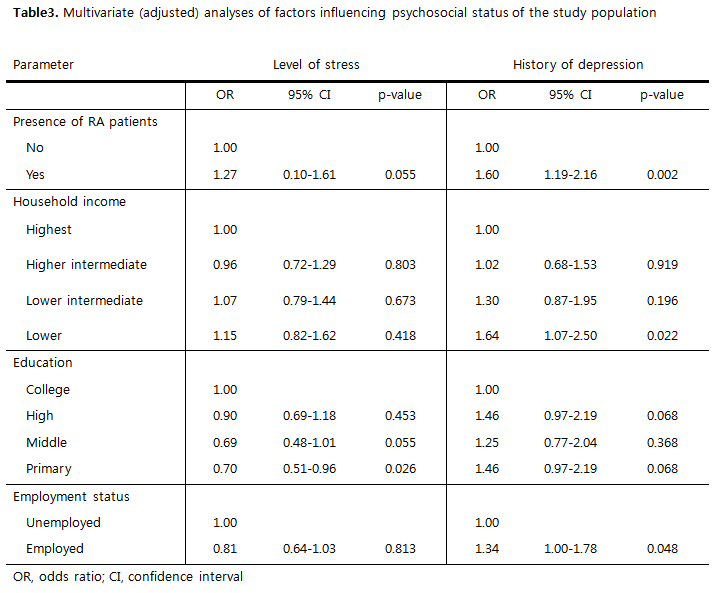Session Information
Title: Rheumatoid Arthritis - Clinical Aspects (ACR): Comorbidities, Treatment Outcomes and Mortality
Session Type: Abstract Submissions (ACR)
Background/Purpose
Rheumatoid arthritis (RA) is a chronic inflammatory arthritis that can cause pain and functional disability, and RA patients have a higher risk of psychiatric disorders, especially depression. However, disability and socioeconomic burden of RA patients can also contribute to psychosocial wellbeing of their family members. To date, several studies have been conducted for evaluation of the burden of caregivers in chronic disease such as stroke and dementia, however, the burden of family members of RA patients has not been evaluated. In this study, we conducted a population-based analysis to examine the psychosocial characteristics of family members of RA patients in comparison with the general population and to evaluate the psychosocial impact of RA patients on their family members.
Methods
From the Fifth Korea National Health and Nutrition Examination Surveys (KNHANES V) (2010-2012) dataset, we identified 452 RA patients and then selected family members of these patients who were aged 20 years or older (n=515). The control group was sampled from members of families without RA patient with matching for sex and age (n=1,545).
We compared the psychosocial characteristics between family members of RA patients and control group. Also, serial conditional logistic regression models were performed to evaluate the association of psychosocial impact with the presence of RA patient after adjustment of covariants.
Results
The mean age was 51.9 ± 18.8 years and sixty percent were male in our study population. Family members of RA patients were more employed (63.6% vs. 60.2%, p = 0.037), and had higher household income (p = 0.037) compared with sex and age-matched control subjects. No significant differences were observed in comorbidities between two groups.
Family members of RA patients had a significantly higher level of stress (29% vs. 24.3%, p = 0.046), history of depression (17.3% vs. 11.9%, p = 0.004). The presence of a RA patient in the family showed significant association with history of depression (odds ratio, 1.60; 95% confidence interval, 1.19 to 2.16; p = 0.002), after adjustment for household income, education level, and employment status.
Conclusion
Family members of RA patients have higher level of stress and they are more susceptible to depression. Our findings suggest that physicians or rheumatologists who treat RA patients should pay more attention to psychosocial burden of their family members.
Disclosure:
S. W. Chung,
None;
J. A. Yang,
None;
E. H. Kang,
None;
Y. J. Lee,
None;
Y. J. Ha,
None.
« Back to 2014 ACR/ARHP Annual Meeting
ACR Meeting Abstracts - https://acrabstracts.org/abstract/psychosocial-impact-of-rheumatoid-arthritis-patients-on-their-family-members/

